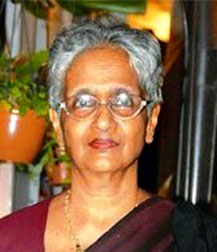Empathic voices in verse
by Dilshan Boange
A review of Sedahamy, Selvakumari and Others
Gratiaen Prize winning poetess Sakuntala Sachithanandan launched her
latest contribution to the sphere of Sri Lankan letters on April 18 this
year. The book Sedahamy, Selvakumari and Others is a collection of sixty
three poems which can be called a versified chronicling of the poet's
perceptions on several subjects and themes over a period of time, which
is principally a period between 2004 and 2014. The outlooks the poet has
over subjects such as the plight of destitute females, the oppressed and
exploited in society, and familial bonds and losses are expressed
emotively and unpretentiously. Here is a voice that is not bashful to
reveal her inner self in language that is accessible to all.
|

Sakuntala Sachithanandan |
The sorrows of women as caregivers and their dutiful commitment to be
caregivers comes out in several poems such as 'Parwathi', 'Sumana', and
'Over the Kelani River with my mother'. What is interesting to note is
that in her collection of verse, Sakuntala shows how she has been
conscious and affected by various events that made the news and caused
much alarm. The poems -'Daughter' and 'Rizana' are two examples. While
the latter's subject matter is very much self evident to anyone who has
been aware of the shocking execution of the young Sri Lankan girl Rizana
Nafeek in Saudi Arabia, the former deals with the Delhi Bus gang rape of
Jyoti Singh. It is imaginatively narrated in the fictional voice of the
mother of the victim.
The startling revelation made in this poem is how the animalism in a
pack of dogs lining up to satisfy their biological urges to mount a
female of their species, has more grace and far less brutality compared
to what the gang of rapists perpetrated.
Grief
Voices that speak openly of a theme related to personal familial
bonds and the grief of loss of a loved one comes out in poems like
'Gone', 'Over the Kelani River with my mother', 'My sister's table'.
Through these poems one gauges that the poet although besieged with
grief has somehow found the strength to accept the loss and now, in a
time and space distant from the immediacy of the loss, presents the
voice of a heart seeking equanimity.
To me this theme has an unpronounced yet nevertheless discernible
nexus with Sakuntala's poems in this book that are based on themes from
Buddhist sutras. 'Kayo Thathayathi Vinasa Bawan', 'Thus have I heard'
are two clear examples of how Buddhism holds an important place in
forming the perceptions of the poet. Further the epigraphic extracts
featured in the book following the Foreword evince how Sakuntala's
poetry relates to the Buddha's teachings of impermanence and also
compassion.
Taking these factors to account it seems that the poet presents how
she has empathised with many subjects of a great emotional nature but
has also accepted how certain sorrows and tragedies are a way of the
world, and seeks to approach these matters with equanimity. It is in
that sense, possibly a statement of her inner reconciliation with
matters that she has found herself at odds with.
Expression
The poems included in the title show two very different ends to the
poet's expression of imagination and empathy. Sedahamy shows how a spark
of inspiration from a somewhat unlikely source as an old land title
deed, takes the poet on a journey of imagination.
The landscapes and glimpses of life she imagines, conjurors up, speak
of how she seeks to reach life and times of a bygone. Selvakumari
glimpses a most tragic life of destitution that has engulfed a woman who
now has no 'utility value' in society.
Neither able to work sweeping the streets nor as a prostitute selling
her body, her redundancy in the world passing her by is pitiful.
The poet thus shows how people can be banished to the fringes of
virtual nonexistence, by society, due to their lack of utility value to
the economy. Many, after all are the likes of Selvakumari who yearn for
but a minor fraction of some of the most basic comforts that we may tend
to take for granted.
Guru
The book has an insightful Foreword by the man who can be called her
guru in guiding her craft of poetry-Mr. Haig Karunaratne, the renowned
dramatist and theatre practitioner whose reputation as a teacher of
English and drama for over twenty five years at my Alma Mater -Wesley
College, is nothing short of legendary. Mr. Karunaratne in his Foreword
gives an approach to gauge the merits and facets of Sakuntala's poetry
for its diction and narrative devices that holds the poems in a 'decolonised'
status, thus making her voice one that is not subservient to the archaic
rigidities of pre-modern English poetry.
A collection of renderings of empathic voices from introspective
awakenings based on observations of facets of Sri Lankan life, and also
her own experience of joys, sorrows, and contemplations, Sakuntala's
latest work is sure to touch the pulse of readers in many ways. |

